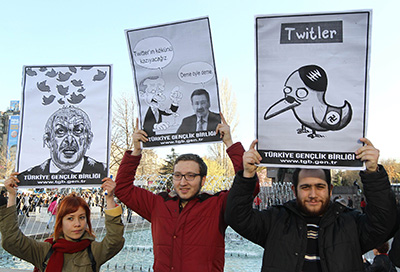New York, March 21, 2014–Turkey banned access to the social media platform Twitter on Friday, hours after Prime Minister Recep Tayyip Erdoğan threatened in a public speech to shut it down, according to news reports. The move comes just ahead of March 30 elections and follows Erdoğan’s threats to ban Facebook and YouTube.
“Prime Minister Erdoğan can keep stepping up his attacks on social media, but they only serve to show that he is afraid of the message and desperate to shoot the messenger,” CPJ Europe and Central Asia Program Coordinator Nina Ognianova said. “We call on Turkish authorities to restore access to Twitter and to substantiate their claims to democracy by allowing all information to flow freely.”
At a campaign rally on Thursday in the western city of Bursa, Erdoğan claimed that a court order justified banning Twitter, according to press reports. The Turkish telecommunications regulator BTK said today that Internet service providers had been ordered to block access to Twitter after several users filed legal complaints in early March about violation of their privacy on the social networking site. BTK said the measure was intended to prevent the possible “victimization of citizens.”
“Any court in any country would implement this kind of decision whenever it notices an attack against people’s privacy rights,” the Turkish Anadolu Agency reported Deputy Prime Minister Bülent Arınç as saying.
But the English-language Turkish daily Hürriyet Daily News reported today that the Istanbul Heavy Penal Court told the Union of Turkish Bar Associations (TBB) that Twitter had been blocked as a result of an “executive decision, not a judicial verdict.” TBB had filed a petition with the court requesting that the ban be lifted, the report said.
Twitter is a popular platform for Turkish whistleblowers, who in recent months have shared numerous recordings–allegedly of Erdoğan and his aides–that implicate top-ranking authorities of corruption, abuse of power, and other wrongdoing. Anonymous Twitter accounts have recently said that particularly sensitive recordings were going to be made available on the Twitter on March 25, a few days before the elections, news reports said.
“The rights to freedom of information and freedom of speech are all the more crucial in the run-up to elections,” CPJ’s Ognianova said.
The blocking of Twitter has already been overcome by many Turkish Twitter users, including Turkish President Abdullah Gül, who called the Twitter ban unacceptable. He said in a tweet: “There is no way that closing down social media platforms can be approved.”
As a sign that the blocking did not have much effect on Twitter traffic, the hashtag #TwitterIsBlockedInTurkey began trending from within the country a few hours after the ban was announced. Neelie Kroes, vice president of the European Commission who is also in charge of the European Union’s digital agenda, called Turkey’s ban “groundless, pointless, cowardly.”
- For more on Turkey, visit CPJ’s Attacks on the Press.
